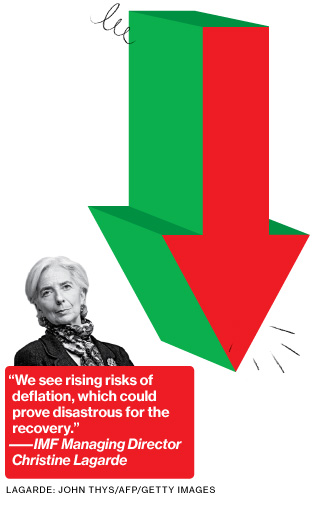The Lurking Threat of Deflation
< < Go Back
By Simon Kennedy and Rich Miller,
Twenty years ago, flat or slow growth in emerging-market economies would have made only a small dent in the expansion of the world’s gross domestic product. But now developing nations make up 40 percent of global GDP. For these countries, the coming year looks like a period of weak growth because of lower prices for commodities, a slowdown in global trade, and sliding exchange rates. Bruce Kasman, chief economist at JPMorgan Chase (JPM), sees a risk that their problems could unleash a “disinflationary impulse through the global economy.”
Disinflation—a drop in the growth of inflation—could become a worldwide problem if the central banks of emerging economies raise borrowing costs too rashly. India, South Africa, and Brazil were among those who boosted interest rates in January as investors dumped their currencies. Bank of America (BAC) predicts that more monetary tightening is likely in South Africa and Brazil. South Korea, Hungary, and Malaysia are expected to increase their benchmark rates by the end of this year as well. Higher borrowing costs will lower demand from such countries as companies and consumers tighten their belts. The slowdown will put more pressure on commodity prices.
The U.S. and other advanced economies could feel a disinflationary pinch if their currencies continue recent gains, making the prices of imported goods cheaper and exports less appealing to markets with weaker currencies. Import prices in the U.S. declined 1.5 percent in January from a year earlier.
Disinflation is bad because it keeps companies from raising prices and workers from getting decent raises. It also can lead to deflation—a drop in prices—which is even worse. “We see rising risks of deflation, which could prove disastrous for the recovery,” International Monetary Fund Managing Director Christine Lagarde said in a speech on Jan. 15. “Deflation is the ogre that must be fought decisively.” Lagarde was speaking about Europe’s slow recovery and its impact on prices.
Federal Reserve Chairman Janet Yellen and European Central Bank President Mario Draghi have said they don’t see deflation or disinflation as threats serious enough to loosen monetary policy further for now. Despite their confidence, Barclays (BCS) strategists say the euro area faces a bigger chance of Japanese-style deflation than investors or policymakers believe. (Deflation in Japan started in the mid-1990s when the banks, wounded by a real estate bubble, stopped lending.) Inflation of 0.7 percent for the euro area is less than half the ECB target. The ECB’s monetary policy is looking too tight, national budgets have been cut aggressively, and bank lending has yet to improve, Barclays said in a recent report.
More From Bloomberg Businessweek:




